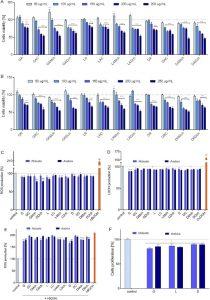Coffee is a globally popular beverage known for its bioactive compounds, especially phenolic acids, which are linked to various health benefits, including protection against oxidative stress, inflammation, and cancer. This study aimed to evaluate the biological activity of coffee extracts obtained from green, light, and dark roasted Robusta and Arabica beans. Researchers assessed the impact of these extracts on human colon adenocarcinoma cells (Caco-2) and their ability to modulate oxidative stress and inflammation in RAW 264.7 macrophages.
Additional Reading: Exploring the link: Gut microbiome and respiratory disease

Figure: The effect of coffee extracts and fractions (50–250 μg/mL) from Arabica (A) and Robusta (B) on Caco-2 cells’ viability determined with MTT assay after incubation with preparations for 12 h. The effect of preparations at 50 μg/mL on intracellular ROS concentration determined with DCFH-DA assay, 500 μM t-BOOH was used as a positive control (C); the effect of preparations on lipid peroxidation was determined with DPPP probe, 100 μM CuOOH was used as a positive control (D); cytoprotective effect of preparations against chemically induced oxidative stress with 500 μM t-BOOH (E); the effect of preparations at 125 μg/mL on cells proliferation determined with BrdU assay (F). The values in each column represent the mean value ± SEM, n ≥ 4. Control cells were only exposed to the vehicle (medium). Statistical significance was calculated against the control cell culture with * p ≤ 0.05, ** p ≤ 0.01, *** p ≤ 0.001.
The results indicated that the roasting process significantly affects the bioavailability and biological activity of coffee compounds. While green coffee beans have higher concentrations of chlorogenic acids (CHAs), roasting reduces these compounds, with light-roasted beans retaining more CHAs than dark-roasted ones. The study further revealed that coffee extracts could decrease oxidative stress and lipotoxicity in macrophages, suggesting potential anti-inflammatory properties. Additionally, the extracts influenced cell proliferation, with mono- and dichlorogenic acids playing a crucial role in these effects.
Interestingly, coffee phenolics were found to inhibit the enzyme topoisomerase IIα, which is involved in DNA replication, making these compounds a promising dietary tool for cancer prevention. The study highlights that while roasting reduces the concentration of some beneficial compounds, it also leads to the formation of new compounds like melanoidins, which contribute to coffee’s health-promoting effects.
In conclusion, coffee extracts, particularly from light-roasted beans, exhibit antioxidant and anti-inflammatory properties that may reduce the risk of chronic diseases such as cancer. Further research is needed to explore these compounds’ therapeutic potential in clinical settings.
Summary by Faith Oluwamakinde










